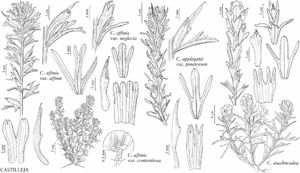Difference between revisions of "Castilleja affinis var. affinis"
FNA>Volume Importer |
FNA>Volume Importer |
||
| Line 44: | Line 44: | ||
|elevation=0–1900 m. | |elevation=0–1900 m. | ||
|distribution=Calif.;Mexico (Baja California). | |distribution=Calif.;Mexico (Baja California). | ||
| − | |discussion=<p>Plants of <i></i>var.<i> affinis</i> of the immediate coast have more or less fleshy leaves. Populations with somewhat inflated and distinctively colored calyces, with yellow tubes and red lobes, are found from Point Reyes south to San Mateo County and have been called <i>Castilleja</i> inflata. A similar situation occurs on the northern Channel Islands, where plants with shorter corollas and paler inflorescences were named <i></i>subsp.<i> insularis</i>. Their indument includes some branched hairs, which might cause them to be identified as the strictly mainland <i></i>var.<i> contentiosa</i>. Hybrids with <i>C. wightii</i> are known from Marin County, California.</p> | + | |discussion=<p>Plants of <i></i></i>var.<i><i> affinis</i> of the immediate coast have more or less fleshy leaves. Populations with somewhat inflated and distinctively colored calyces, with yellow tubes and red lobes, are found from Point Reyes south to San Mateo County and have been called <i>Castilleja</i> inflata. A similar situation occurs on the northern Channel Islands, where plants with shorter corollas and paler inflorescences were named <i></i></i>subsp.<i><i> insularis</i>. Their indument includes some branched hairs, which might cause them to be identified as the strictly mainland <i></i></i>var.<i><i> contentiosa</i>. Hybrids with <i>C. wightii</i> are known from Marin County, California.</p> |
|tables= | |tables= | ||
|references= | |references= | ||
| Line 68: | Line 68: | ||
|publication year= | |publication year= | ||
|special status=Selected by author to be illustrated | |special status=Selected by author to be illustrated | ||
| − | |source xml=https://jpend@bitbucket.org/aafc-mbb/fna-data-curation.git/src/ | + | |source xml=https://jpend@bitbucket.org/aafc-mbb/fna-data-curation.git/src/f6b125a955440c0872999024f038d74684f65921/coarse_grained_fna_xml/V17/V17_1014.xml |
|genus=Castilleja | |genus=Castilleja | ||
|species=Castilleja affinis | |species=Castilleja affinis | ||
Revision as of 18:26, 24 September 2019
Stems: hairs sparse or dense, unbranched, rarely branched. Leaves not or ± fleshy. Inflorescences (2.5–)3–5 cm wide; bracts proximally green or deep purple, distally bright red to red-orange, crimson, or scarlet, rarely yellow, orange, rose, magenta, or pinkish red, 5(–7)-lobed. Calyces colored as bracts, or yellow with red (or light orange or yellow) lobes, sometimes white with colored lobes, 20–35 mm. Corollas (21–)25–40 mm; beak usually long-exserted, sometimes slightly so, 12–20 mm.
Phenology: Flowering Feb–Aug(–Oct).
Habitat: Chaparral slopes, openings, open woods, coastal scrub, stabilized dunes.
Elevation: 0–1900 m.
Distribution
Calif., Mexico (Baja California).
Discussion
Plants of var. affinis of the immediate coast have more or less fleshy leaves. Populations with somewhat inflated and distinctively colored calyces, with yellow tubes and red lobes, are found from Point Reyes south to San Mateo County and have been called Castilleja inflata. A similar situation occurs on the northern Channel Islands, where plants with shorter corollas and paler inflorescences were named subsp. insularis. Their indument includes some branched hairs, which might cause them to be identified as the strictly mainland var. contentiosa. Hybrids with C. wightii are known from Marin County, California.
Selected References
None.
